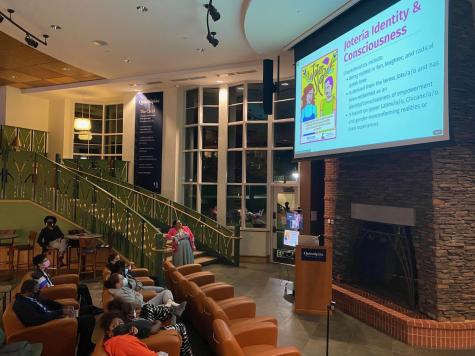Highlighting the intersections of Latino and LGBTQ communities
October 19, 2021

Quinnipiac University has made various efforts to bring diversity to campus by hosting cultural events, but is it enough? Intersectionality between the Latino and the LGBTQ community is a forgotten topic among students due to lack of awareness.
In honor of Latino and Hispanic Heritage month, Luz Burgos-Lopez, assistant dean of students at the University of Connecticut and the co-founder of Colectivo Bambula, and her colleague, Sergio Gonzalez, a doctoral candidate teaching at Claremont University discussed the challenges within the Latino community, the struggles of identifying as queer and how allies can support the queer Latino students in higher education.
“I also have the awareness and the understanding to recognize that being a white Puerto Rican cis woman makes me more acceptable and provides me the ability to challenge anti-Blackness and whiteness in ways that my Black peers can’t,” Burgos-Lopez said.
Burgos-Lopez and Gonzalez engaged the audience by analyzing terms and definitions individuals may be uncomfortable or unfamiliar with. For example, cisgender is a term commonly used to describe people whose gender identity corresponds with the sex they were assigned at birth.
“Being cisgender or passing (cisgender) is considered a privilege,” Gonzalez said. “Of course, those of us who are cis don’t understand what it’s like to be trans or non-binary, but if someone says something problematic, correct them and have a conversation on why it’s wrong.”
Another term that stood out was jotería. This is a term that derives from the derogatory colloquial Spanish-language term joto, meaning sissy, typically used to degrade men. To be queer and bullied into a stereotype of femininity is unfair because everyone has their own individuality that makes them unique. Identifying as queer is not someone’s entire personality. However, jotería has been reclaimed as a word of empowerment meaning, fun, laughter and associated with radical queer love.
There are ways to help these communities overcome oppression, homophobia and transphobia like spreading the word and sticking up for friends. Burgos-Lopez mentioned most people consider themselves an ally, but if you have
to think about the last time your friend has asked you for help, are you really an ally?
Alicia Garza, co-founder of the Black Lives Matter movement said in an interview with Jeseina Santana, program officer of Novo Foundation in June 2016, “The thing I don’t like about the word ally is that it is so wrought with guilt and shame and grief that it prevents people from doing what they ought to do.”
It’s all about stepping down from the pedestal and giving up power in exchange for empowerment and reassurance. Many men follow the status quo of wanting to be perceived as masculine. Gender is a social construct where we should be able to disassociate from what is on the outside and focus on how we feel on the inside. Attraction, hobbies and interests shouldn’t determine your gender identity.
According to an article from the Human Rights Campaign, 37 transgender people were killed this year, with the majority being Black women. Burgos-Lopez displayed a graph with the names and dates of when the trans victims were murdered. Burgos-Lopez noted that, since the article came out, three more were killed, raising the death count to 40. With three months left until the new year, who knows how many more lives will be targeted?
“Seeing how many deaths there has already been this year is crazy, especially since the death count is higher than last year’s. It is so much different when you are seeing the numbers versus hearing about it,” Olivia Ealim, a first-year psychology major said.
During this time, it is important to come together, making sure Quinnipiac and all communities are safe spaces. Reaching out to friends by asking how they’re doing and what you can do to help makes all the difference. Even attending an event to learn more and get yourself involved can help diversify your knowledge and prompt mutual understanding.
“Having a FYS (first-year seminar) that has content similar to the event would be so beneficial,” said Leeya Joseph, a first-year chemistry major. “I know other students personally who would have liked to be at this event but can’t because of their class schedule. We have classes like Blackness in Media and Black In Higher Ed but there are no to little classes about LGBTQ+, intersectionality, or even Latinx. We lack classes for the Latinx community in general.” To get yourself more engaged or if you would like to learn more, here are some resources Burgos-Lopez and Gonzalez provided.
The X in Latinx is a Wound, Not a Trend- Alan Pelaez
In The Thick Podcast: Black Trans Resistance Disclosure on Netflix
NEGRO: A docu-series about Latino Identity
New Haven Pride Center
The National Queer and Trans Therapists of Color Network (NQTTCN)






